
 Flash News
Flash News
Arrests of "Bankers Petrolium", Prosecution provides details: Exported and sold 532 billion lek of oil, caused millions of euros in damage to the state
Ndahet nga jeta tragjikisht në moshën 28-vjeçare ylli i Liverpool, Diogo Jota
Posta e mëngjesit/ Me 2 rreshta: Çfarë pati rëndësi dje në Shqipëri
Ceno Klosi with over 800 stolen votes, Balluku finds the reason is the tiredness of the counters
"Fast & Furious" in the former Block, police chase an Audi Q8, 4 cars collide

Alfred Lela
There’s no need to line up theories or backstage gossip about Rama regarding his non-liquid relationship with the new American administration, or his efforts to renew access after the Democrats’ loss, and consequently, the decline of Soros’s influence in Washington.
It’s enough to observe his campaign, or its narrative, to see that Rama is trying to rebrand himself as a pro-European figure while souring into an American-skeptic.
He is attempting to ride the European wave of American skepticism that followed Trump’s victory, and from it, extract domestic electoral benefits.
Let’s be clear: Edi Rama is neither anti-American nor anti-European — he doesn't have the guts to be either. But he needs both, and every posture he adopts, whether toward one side or the other, is purely political necessity.
Rama no longer has the U.S. Embassy as an ally ready to leap into the fire for every ethical or political transgression of his. Nor does he have the protective umbrella of the Soros family in Washington anymore.
That’s why he has scrubbed the 50 stars of the American Confederacy (metaphorically) from his campaign speeches, replacing them with the 12 blondies of the European flag.
He is conducting a plastic surgery of propaganda: subtle enough not to disfigure himself before the Americans, while trying to present himself to the Europeans as a reliable partner in an increasingly unpredictable post-Communist Balkans.
Not a fanatic of America — especially not of Trump’s America — but a Euro-Atlanticist, where Europe has its rightful place, voice, and weight.
It’s not just the macro changes that have forced Rama into a turn he never truly desired. The fact that his wife had signed under the foreword of Kamala Harris’s book, and that the Socialists were ready — fireworks and champagne in hand — to celebrate the victory of the Democratic candidate, showed that Rama was preparing for a guaranteed fourth term. If Harris had won, Edi Rama’s campaign would look entirely different today. But in Tirana, those who defeated Kamala Harris and the Soros family have now arrived. One of them, Chris LaCivita, made it clear from the very first day:
You cannot be a puppet of Soros in Tirana and a friend of America at the same time.
Even though Rama tries to brush it off — calling him “Latif” — the fact that he cannot go a day without mentioning him, often in long, rambling sentences, shows that LaCivita is more than a sheriff or a Latif to him: he is a discomfort, a sore spot.
This was also evident from the “Brancaleone chorus” of his media supporters after PD signed a contract with Trump's lawyer, Carlos Trujillo. More than the contract itself, what seems to bother them is the fact that it wasn’t done behind closed doors — it was declared openly, with real names, in full legality.
Of course, Rama doesn’t mention Trump directly — he made that mistake only once, when Trump was still a candidate — but he isn’t happy with his administration. His efforts to find a "Charlie" even among the Republicans have failed.
This is what drives him crazy about LaCivita and the Trump-connected relationships with PD. Rama is used to, for a long time, being the sole negotiator and payer of the internationals. It is this awareness of his impotence that now makes him sound so powerless — as if Chris LaCivita had come not to PD headquarters (“SHQUP”), but into his craftman's cave in the bunker in Surrel.
Latest news



Fire situation in the country, 29 fires reported in 24 hours
2025-07-03 12:00:04
The constitution of the Kosovo Assembly fails for the 41st time
2025-07-03 11:59:57
The gendering of politics
2025-07-03 11:48:36

The price we pay after the "elections"
2025-07-03 11:25:39

Xhafa: The fire at the Elbasan landfill was deliberately lit to destroy evidence
2025-07-03 11:08:43

The 3 zodiac signs that will have financial growth during July
2025-07-03 10:48:01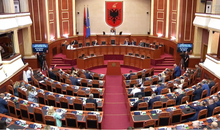
Democratic MP talks about the incinerator, Spiropali turns off her microphone
2025-07-03 10:39:24

Ndahet nga jeta tragjikisht në moshën 28-vjeçare ylli i Liverpool, Diogo Jota
2025-07-03 10:21:03
Cocaine trafficking network in Greece, including Albanians, uncovered
2025-07-03 10:10:12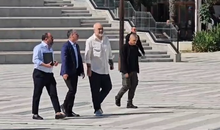


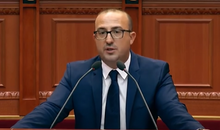
Korreshi: Election manipulation began long before the voting date
2025-07-03 09:39:13
Arrest of Greek customs officer 'paralyzes' vehicle traffic at Qafë Botë
2025-07-03 09:28:41
After Tirana and Fier, the boxes are opened in Durrës today
2025-07-03 09:21:10
Enea Mihaj transfers to the USA, will play as an opponent of Messi and Uzun
2025-07-03 09:10:04

Foreign exchange, the rate at which foreign currencies are sold and bought
2025-07-03 08:53:50
Index, Albania has the worst quality of life in Europe
2025-07-03 08:48:10


Horoscope, what do the stars have in store for you today?
2025-07-03 08:17:05
Clear weather and high temperatures, here's the forecast for this Thursday
2025-07-03 08:00:37
Posta e mëngjesit/ Me 2 rreshta: Çfarë pati rëndësi dje në Shqipëri
2025-07-03 07:46:48




Lufta në Gaza/ Pse Netanyahu do vetëm një armëpushim 60-ditor, jo të përhershëm?
2025-07-02 21:56:08
US suspends some military aid to Ukraine
2025-07-02 21:40:55



Methadone shortage, users return to heroin: We steal to buy it
2025-07-02 20:57:35
Government enters oil market, Rama: New price for consumers
2025-07-02 20:43:30
WHO calls for 50% price hike for tobacco, alcohol and sugary drinks
2025-07-02 20:41:53







Israel agrees to 60-day ceasefire in Gaza, but many unanswered questions remain
2025-07-02 18:35:27
The weather in Germany is going "crazy", temperatures reach 40°C
2025-07-02 18:22:21

"Fast & Furious" in the former Block, police chase an Audi Q8, 4 cars collide
2025-07-02 17:59:25
"Birth on a tourist visa? US Embassy warns Albanians: This is prohibited!"
2025-07-02 17:48:16


BIRN: Fier recount reveals vote trafficking within open political party lists
2025-07-02 16:57:19

CEO and former director of 'Bankers Petroleum' arrested in Fier
2025-07-02 16:40:42
Car hits two tourists on a motorcycle in Fushe Arrëz, one of them dies
2025-07-02 16:33:23



Fire at the Elbasan Incinerator Landfill, Prosecution Launches Investigations
2025-07-02 15:34:54
What you need to know if you travel to a country with active volcanoes
2025-07-02 15:33:03



EU proposes 90% reduction in greenhouse gases by 2040
2025-07-02 14:50:23
Europe is burning from the heat / Italy and France are on maximum alert
2025-07-02 14:36:52

Moscow's contradictory statements: Is the friendship with Vučić breaking down?
2025-07-02 14:21:05
'I lost my battle': Sea warming is killing fishing in Albania
2025-07-02 14:08:35
Sekretet kimike që ndihmojnë në mbajtjen e mjaltit të freskët për kaq gjatë
2025-07-02 14:01:26
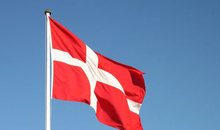
Denmark makes historic decision to make military service mandatory for women
2025-07-02 13:44:33
The appeal of the GJKKO leaves former judge Pajtime Fetahu in prison
2025-07-02 13:30:20
Productivity losses could reduce GDP by 1.3% as a result of extreme heat
2025-07-02 13:21:04
He abused his minor daughter, Zamir Meta is left in prison
2025-07-02 13:04:04

Waste burning in Elbasan, Alizoti: They are poisoning people and stealing money
2025-07-02 12:48:39
Civil disobedience continues in Serbia, dozens of people detained
2025-07-02 12:40:32
Rama's government was born under the sign of garbage and will end like this
2025-07-02 12:28:09
Water prices increase in the municipalities of the Elbasan region
2025-07-02 12:13:38
Civil disobedience continues in Serbia, what is happening in Belgrade?
2025-07-02 12:07:44
Serious accident in Thumanë, one dead, 3 injured
2025-07-02 11:54:42
Durrës Court suspends the director of Pre-University Education from duty
2025-07-02 11:49:27
Plenary session on Thursday, what is expected to be discussed
2025-07-02 11:36:43
Europe is burning from heat waves/ What is the 'thermal dome' phenomenon?
2025-07-02 11:26:25
Wanted by Italy for murder, 45-year-old arrested in Vlora
2025-07-02 11:19:31
Fire situation, 28 fires reported in 24 hours, 2 still active
2025-07-02 11:13:20
"Buka" file, preliminary hearing for Ahmetaj postponed to July 17
2025-07-02 11:03:30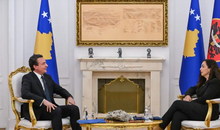


Baçi: Belinda Balluku and Ceno Klosi, the most dangerous "gangs" in Fier
2025-07-02 10:32:09
Zamir Meta, suspected of sexually abusing his daughter, arrives in court
2025-07-02 10:21:33

Trump: Israel has agreed to a 60-day ceasefire in Gaza
2025-07-02 10:01:55
Fire continues at Elbasan landfill
2025-07-02 09:51:13
